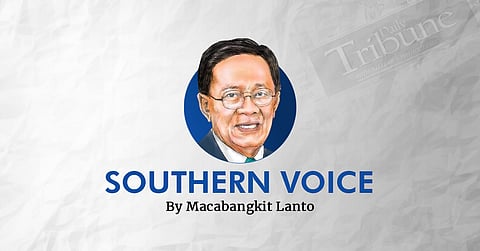
- NEWS
- the EDIT
- COMMENTARY
- BUSINESS
- LIFE
- SHOW
- ACTION
- GLOBAL GOALS
- SNAPS
- DYARYO TIRADA
- MORE

The BARMM is all set for its full institutionalization as a regional political autonomous entity. All indications point in that direction. In a classic case of “the early bird catches the worm,” BARMM leaders are prepping for the first parliamentary election in 2025, a milestone in its political life.
Following the mandate of the Bangsamoro Organic Law, or BOL, it has enacted into law the Regional BARMM Election Code that defines rights, duties, and protocols for conducting the first-ever parliamentary polls.
Never mind that some of its provisions are now under scrutiny by the Supreme Court after Muslim leaders, headed by lawyer Dimnatang Pansar, president of the Municipal Mayors League of Lanao del Sur, questioned their constitutionality for supposedly being an exercise of power outside the ambit of the BOL. The worst-case scenario, they claimed, is perhaps the declaration of nullity of one or a few of the questioned provisions but not of the entire code itself. They expressed optimism that the Supreme Court will allow a modicum of flexibility and liberality in its interpretation to give meaning to autonomy as a political solution to social malaise.
A feature of a parliamentary system of government, juxtaposed with a presidential one, which Filipinos are more familiar with, could be a party democracy — a political party taking center stage, unlike in the Philippine setting, where it is personality-oriented.
A political party system plays a vital role in the framework or structure of government. Although theoretically, Montesquieu’s tripartite of power (executive, legislative and judiciary) with the inherent checks and balances is ideal in a democracy, this is hardly applicable in a parliamentary government where the executive comes or derives its power from the legislature or parliament. There is a theoretical fusion of these two branches of government. The government of the day is run by the party that commands the majority in the parliament through election and/or the coalition of parties. Many political theorists posit that the parliamentary form is more democratic than the presidential.
It is perhaps with this in mind that the leadership of the BARMM and the Moro Islamic Liberation Front kicked off, way ahead, the organization of its United Bangsamoro Justice Party, an auspicious signal of the shift of battle from the boondocks of Morolandia to the parliament where they could struggle for their advocacies in a free market of ideas, and not through the barrel of a gun.
This thought has incentivized the organization of political parties in the region. Now, we see the mushrooming of these parties to the delight of advocates against the status quo in Morolandia, which has plunged the region into misery.
We read in the media of the following regional political parties which will slug it out in the 2025 parliamentary election, viz., the UBJP headed by no less than the interim Chief Minister as chairman of the MILF; Serbisyong Inklusibo-Alyansa ng Progresibo headed by Gov. Bombit Adiong in alliance with the three-term mayor of Marawi City, Sultan Majul Gandamra, and the municipal mayors of Lanao del Sur; Al-Ittihad Mindanawe Darussalam-Ungaya ku Kawagibu Bangsamoro headed by Technical Education and Skills Development Authority Secretary Suharto “Teng” Mangudadatu; Bangsamoro People’s Party headed by Members of Parliament Amir Mawillil and lawyer Rasol Mitmug, former Speaker of the defunct ARMM; Bangsamoro Party headed by MP Muslimin Sema; and the AAMAN Party headed by former provincial prosecutor Cairoden Pangonotan.
One cannot help but notice that these parties are basically formed along tribal identities. We are in the dark whether the Sama tribe of Tawi-Tawi also has a regional political party.
Under the BOL, of the 80 members of Parliament, 40 percent will come from the party system, 32 percent from the legislative districts, and at least 10 percent or eight from the “women, youth, indigenous people, settler communities, traditional leaders and the Ulama” sectors.
We observe these developments with interest. Anything other than the status quo is welcome. We are full of hope that the autonomy for which precious lives were sacrificed in a pyrrhic battle could be weaponized to liberate Moros from the morass of poverty, illiteracy, social malaise, stagnation, and injustice.
amb_mac_lanto@yahoo.com
